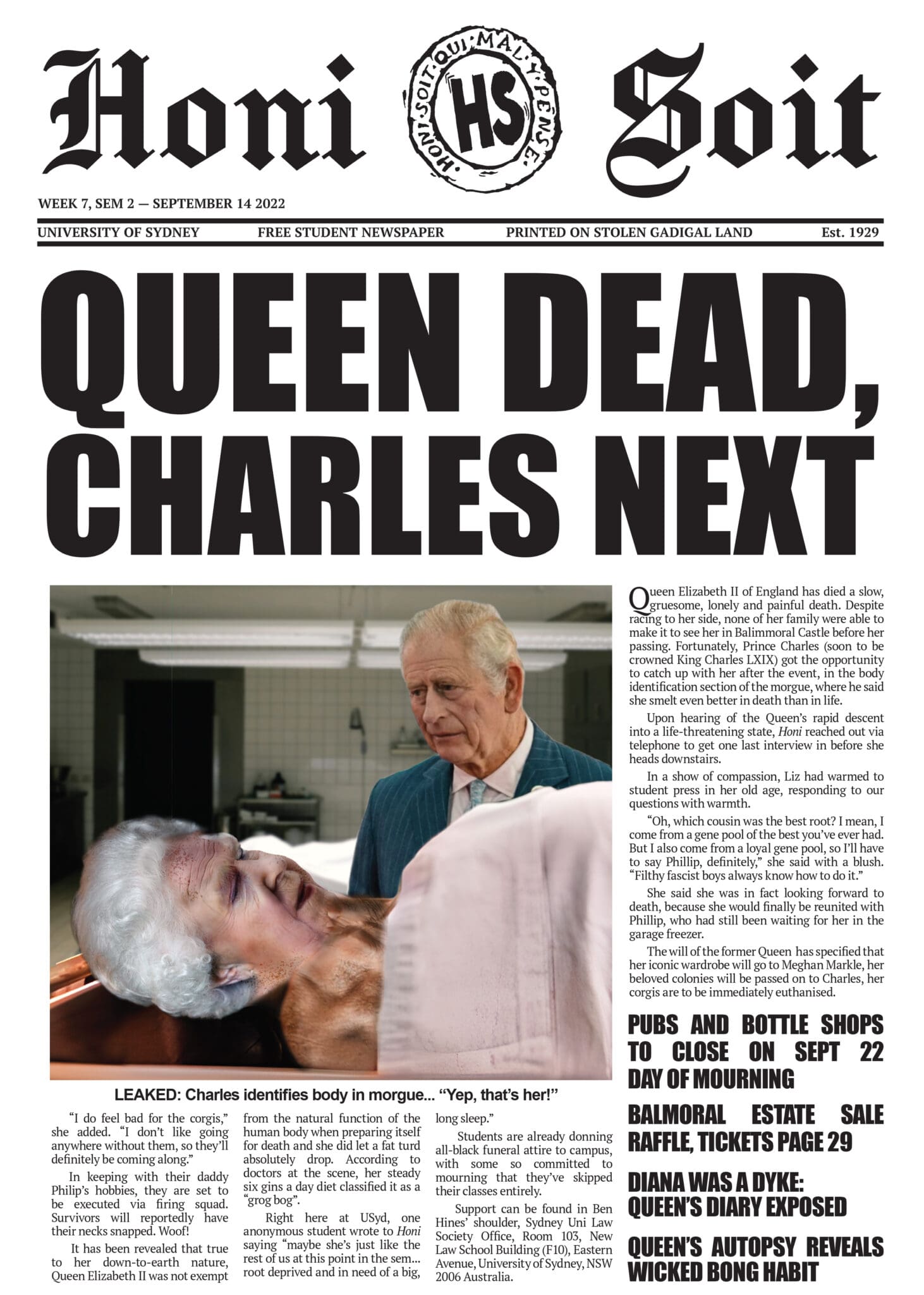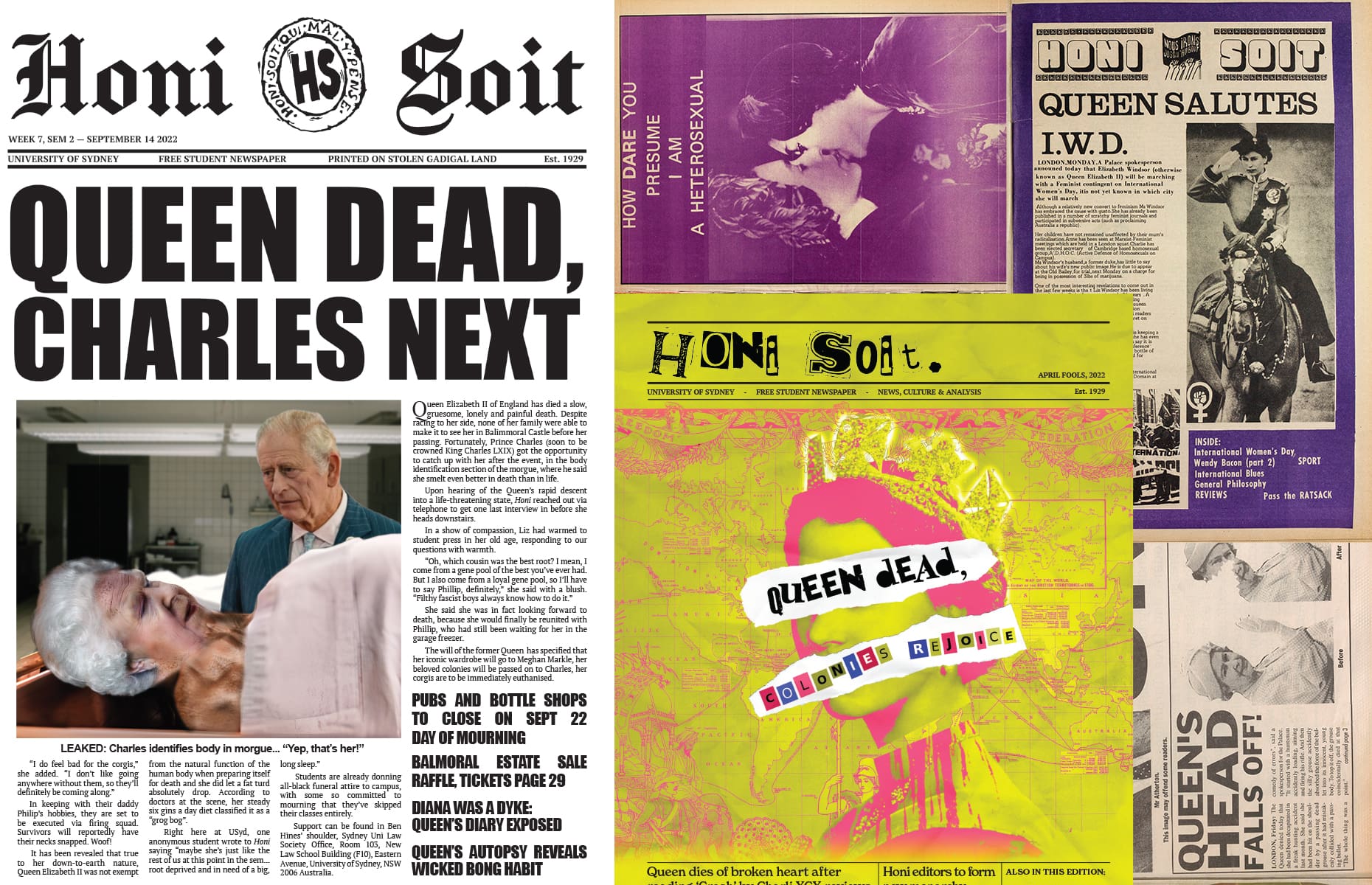Last Friday, in marking the death of Queen Elizabeth II, BBC Radio 1 brought attention to a phrase the Queen held in high regard and repeated often, the motto of the Order of the Garter — honi soit qui mal y pense.
Most tellings recount that the phrase rose to prominence when King Edward III was dancing with his cousin, Joan of Kent, and her garter slipped down. Those in the room laughed in bemusement, revelling in her humiliation. Edward III was disgusted: he put the garter around his own leg, scowling “honi soit qui mal y pense”. Shame upon he who thinks evil of it.
In 1929, students of the University of Sydney were subject to a months-long onslaught from mainstream press following rowdy (read: standard uni student) behaviour following a Commemoration Day event. Sydney newspapers characterised the undergraduate cohort as immature, destructive and entirely unwelcome to participate in civil society. In response, students started their own newspaper, Honi Soit.
The BBC reflected on the Queen’s frequent use of the phrase with nostalgia, explaining her love for it through her optimistic personality. She liked to put a joyful spin on a negative situation, and thought poorly of people who didn’t. The Queen must have been truly averse to critical thinking if this is her genuine understanding of the motto.
“We will not make statements for the joy there is in making them,” reads the first edition of Honi Soit. “Our criticism will be constructive, and for the good of all.”
To think evil of it is not to be a general hater in your everyday life; it gets at something much deeper. It is to accept the opinion that is handed to you, the one most convenient at the time. To mindlessly ridicule for no reason but to follow the lead of those around you. To take on the judgement of mainstream media as your own, no matter how little logic or ethical thought might be behind it. To think evil of whatever you’re told to is certainly the most shameful, the most evil, act of all.
It’s a matter of fact that many people won’t like the cover of this week’s paper, or the tone with which we have reflected on the Queen’s death. People will say we’re being insensitive: someone has died! Her family didn’t make it by her side! You might not have liked her, but she was a kind old woman! Remember that time she displayed a normal human level of humour! She’s just like you and me!
We ask these people instead to reflect on the irreparable damage the Queen’s legacy, as a beacon of violence and colonialism, will leave. In Australia, in Palestine, in Ireland, in South Asia, in every single one of the colonies. We ask you to think of the countless innocent, vulnerable lives lost because of the acts of her Empire. We don’t wish to jump into empathy for the life of someone who benefited from and represented more death and destruction than love or care.
Elizabeth II sat on a throne that was deeply, inextricably implicated in the exportation of cruelty, exploitation, and dehumanisation that formed the British Empire. Her vast wealth is the spoils of colonisation. Her dogged sense of duty to the Crown — so frequently praised by her supporters — represents a wholehearted endorsement of the British colonial project. Her neutrality and steadfastness was, in reality, a moral absence: the Queen refused to criticise the mass theft of lives, possessions, and futures that occurred in her family’s name, because she was so deeply entangled in it.
In fact, when framing the topic through a less morally and logically biased view, the global wave of grief triggered by Queen Elizabeth II’s passing is actually disturbing. Major news publications plastered obituaries over their pages last Friday, memorialising her seven decades of rule. Even among progressive circles, the resounding emotional response has been plagued by respectability politics. Why is it that we hold this woman, whose wealth and whiteness existed on an almost metaphysical scale, in such high regard, and not that of those who suffered under her reign?
Within this emotional landscape, characterised by shock and reverence, voices critical of the monarch have been publicly damned. The Chaser, who published a slew of jokes about the Queen’s death (see: “R U OK day not going well at Palace” and “Dark Day: Nation in mourning after reading the words ‘King Charles’”), were condemned by news outlets and social media users for ‘crossing the line’.
The NRL Integrity Unit is currently investigating Newcastle Knights halfback Caitlin Moran, following a tweet she made referencing the Queen which read “todays a good fkn day… this dumb dog dies Happpy fkn Friday.” Ray Hadley, football commentator and resident dickhead at 2GB Radio, described Moran’s post as “perhaps the most reprehensible thing ever seen connected to rugby league,” dismissing the NRL’s chronic protection of perpetrators of domestic violence, or their never-ending refusal to adequately deal with racism.
“I agonised over whether it should be revealed,” Hadley said. “If she plays tomorrow it will be a disgrace of monumental proportions.”
It is absurd that opprobrium towards the monarchy for instigating and perpetuating imperialism around the globe should be acceptable, meritorious even, in day-to-day left-wing discourse, but not in the wake of its leader’s passing. Our society’s compulsion to publicly exhibit respect for her death — when so many violently-suffered deaths under British colonial rule during her reign are afforded much less — leaves much to interrogate about the West’s inability to deal with its own colonial legacy.
We encourage all readers to challenge their emotions around the Queen’s death, and ask them to decide with criticism and empathy where their grief should truly be placed.
If it is true that your heartfelt emotions for the Queen are so deep, so insurmountable, that you’re uncomfortable with some being relieved by her death, then one can only assume the personal stake you have in protecting the systems she upheld.
Honi soit qui mal y pense.






